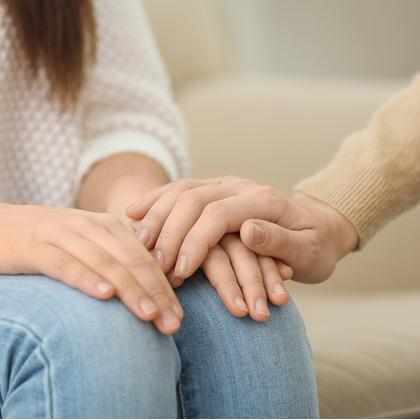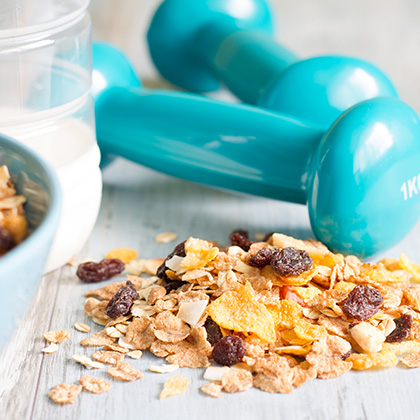
It’s normal to eat less than usual from time to time – when the weather’s very hot, for instance, or when you’re worried or under a lot of stress. But if your appetite is persistently poor it can cause problems with your health and well-being, as it means your body could be short of the nutrients it needs to produce energy and stay healthy (in other words, you may be at risk of malnutrition).
One of the other problems associated with not eating enough on a regular basis is that you can lose too much weight and become underweight. Being underweight and malnourished are linked with a number of health conditions, including:
-
Weakened immunity
-
Weak and brittle bones (osteoporosis)
-
Chronic lack of energy (low blood sugar)
-
Depression and/or anxiety
Physical signs you’re not eating enough
Some of the things you could look out for that strongly suggest you’re not eating enough include the following:
You’re losing weight unintentionally
Even if you don’t weigh yourself, you may find your clothes are all becoming too big, and if you wear jewellery your rings may start to become loose (if you wear dentures they too can loosen and fit poorly). According to the NHS, unintentionally losing five to 10 per cent of your body weight within three to six months can be a sign of malnutrition (i).
Am I underweight?
You can tell if you’re underweight by working out your body mass index (BMI) using the NHS BMI healthy weight calculator. If your BMI is less than 18.5 you’re classed as underweight (though some people with a BMI of less than 20 may also be at risk)
You feel tired all the time
Not eating enough can slow down your metabolic rate and cause fatigue, and you may find even a small amount of light physical activity wears you out.
You find it hard to concentrate
A poor appetite can cause problems with your cognitive health too, as your brain may be lacking the nutrients it needs to work effectively.
You always feel cold
A slow metabolic rate may also affect your body temperature, making you feel cold all the time, even during the summer months.
Your hair feels thinner than usual
Hair needs nutrients to stay healthy, so if you’re eating less than you should you may notice yours feeling thinner, or that you’re shedding more hair than you used to. Read more about hair loss and thinning hair in our guide to hair loss reasons and causes.
You get constant colds and other illnesses
Not eating enough affects your immune system, so you may find that you catch every bug that’s going around (and take longer than usual to recover from them). Other signs your immune system isn’t performing normally include persistent cold sores and other skin problems such as wounds that take a long time to heal.
You’re always in a bad mood
Irritability and moodiness have also been linked to not eating enough (this may be at least partly caused by low blood sugar).
If you have little interest in eating, you may not be drinking enough too. If you don’t drink enough it can lead to dehydration, which can make your skin and mouth dry plus cause lightheadedness and headaches. The main sign to look out for that suggests you may be dehydrated is dark-coloured urine (if you’re sufficiently hydrated your urine should be paler in colour, like straw). Dehydration can also affect your appetite, making you want to eat less.
What is a healthy diet?
Even if you don’t have a great appetite it’s still important to eat as healthily as you can, which means choosing the most nutritious foods from the different food groups. The Eatwell Guide is an ideal blueprint for a healthy diet – here’s what it says you should eat to achieve a healthy, balanced diet:
Fruit and vegetables
Aim for five portions a day of fresh, tinned, dried, juiced or frozen foods. If, however, you don’t have a very good appetite, don’t fill up on these foods alone as they are typically low in calories. Try to make sure you have plenty of other foods as well.
Starchy carbs
These include foods such as potatoes, bread, rice, pasta and cereals. Have some with every meal (they should make up about a third of your plate).
Protein
Foods rich in protein include meat, fish, poultry, eggs, beans, lentils and vegetarian alternatives such as Quorn and tofu. Aim to eat some protein every day.
Milk and dairy foods
These also include vegetarian alternatives such as soya milk and soya yoghurts and spreads. Have some of these every day too. People with a healthy appetite are advised to choose lower-fat dairy foods, but if you need to add extra calories to your diet you could try having full-fat versions instead (however check with your GP first as full-fat dairy foods may not be suitable for you).
High-fat, high-salt and high-sugar foods
If you have a small appetite you may be tempted to eat these foods frequently – including chocolate, cakes, biscuits, crisps, sugary soft drinks, butter, ghee and ice cream – to add calories to your diet. But because many of these foods have little nutritional value it’s a better idea to only have them occasionally and in small amounts, and to eat more healthy foods instead. However, if you have a very poor appetite and need to increase your calorie intake drastically to improve your energy level, some of these foods can be added to other healthier foods (see below, How to eat more).
Drinks
Experts recommend that we all drink six to eight cups or glasses of fluids – including water, tea, coffee, milk, juice and sugar-free drinks – every day.
If you need help adapting the advice from the Eatwell Guide to manage a reduced appetite, ask your GP to refer you to a registered dietitian.
What causes a loss of appetite?
Not wanting to eat very much is usually a symptom of another problem, even when a poor appetite doesn’t last for long. Some of the many health conditions that can make you lose your appetite – both in the long and short term – include the following:
-
Common short-term infections such as colds, flu, gastroenteritis and urine infections; plus longer-lasting infections including HIV and tuberculosis (TB)
-
Depression, stress and anxiety
-
Digestive problems such as constipation, indigestion and heartburn, as well as chronic conditions including Crohn’s disease, colitis, diverticulitis and coeliac disease
-
Oral problems such as toothache, gum disease, jaw pain, a dry mouth, a nasty taste in your mouth and losing your sense of taste
-
Eating disorders such as anorexia nervosa
-
Chronic pain – this can be caused by numerous conditions, and in each case it has the potential to affect your appetite
-
Liver disease
-
Cystic fibrosis
-
Certain forms of cancer, including some treatments for cancers. Loss of appetite can even be an early symptom of cancer
As well as cancer treatments, other medications can make you lose your appetite as a side effect. These include some medicines for type 2 diabetes, some antidepressants, opiate-based painkillers and medicine used to treat ADHD.
Does appetite decrease with age?
A reduced appetite is indeed a common problem for many people as they get older. Experts believe this happens because some older people tend to be less active than they used to be. It’s also thought that the stomach may empty more slowly in older age, making you feel full for longer (ii).
But eating less than your body needs to stay healthy shouldn’t simply be dismissed as a natural part of old age. No matter how old you are you still need a nutritious diet to maintain your physical and mental well-being and to give you energy. Also, according to the NHS, being underweight can be especially serious for older people because it increases the risk of health problems such as bone fractures (a common risk of osteoporosis) (iii).
Whatever your age, if your loss of appetite persists for no obvious reason, if you’re underweight or if you’ve suddenly lost weight unintentionally, speak to your doctor because you may have a medical condition that could be treated.
How to get your appetite back
If you don’t feel like eating much, it’s really not easy to force yourself to eat more. However, the best plan may not be to eat a greater volume of food but to make your diet more nutritious. There are also lots of clever ways you can add calories to your meals without needing a bigger plate.
According to the NHS, one of the first things you can do is to switch to smaller meals and frequent snacks, so that you’re not struggling to eat three big meals every day (iii). The idea is to make sure you eat something small but on a regular basis, to help keep your energy levels up (aim to eat something every two to three hours).
Here are a few more tips you may find helpful:
Choose meals that are easy to prepare
Microwaveable ready meals are useful if you don’t like to cook, or if the smell of cooking puts you off your food. However some ready meals can be high in salt, so try to choose ones that are lower in salt.
Avoid diet foods
This includes foods labelled fat-free, lite, light, low fat, low sugar or reduced sugar. However, if you have a medical condition it may not be a good idea to eat lots of sugary foods – check with your GP if you’re not sure. If you do eat sugar regularly, try to take extra care of your oral health too.
Go for nutrient-dense snacks
Opt for nuts and seeds, avocado, dark chocolate or natural whole yoghurt rather than crisps or sweets. Keep snacks close by at all times so that you can graze on them throughout the day.
Try to eat one pudding or dessert after one meal every day
If you feel too full eat dessert straight after your meal, wait half an hour or so before having it.
Get some fresh air before meals
This can help stimulate your appetite (have a brisk walk too if you can, as exercise can also make you feel hungrier).
Quit smoking or don’t smoke close to meals
Smoking can kill your appetite so if you smoke, try to avoid it for at least half an hour before having something to eat (better still, think about quitting – read more about this in our guide to stop smoking).
Try having a smoothie or a shake for one of your meals
If you can’t face solid food three times a day. Some shakes are specially designed with weight gain in mind, or you could try a whey or pea protein shake if you find it difficult to eat enough protein (you can even add protein powder to your meals and drinks to get more in your diet).
Keep your diet as varied as possible
This will stop you from getting bored with your food and ensure you are maintaining your daily nutrient goals as best as possible.
Stick to regular meal times
If you can, a set routine will help even more if you choose times when you usually feel more like eating rather than the conventional breakfast, lunch and dinner times.
Drink plenty of fluids
A lot of our daily water intake comes from our meals so if you are struggling to eat because of poor appetite this can mean you could also end up dehydrated. Try not to drink much before you eat, as fluid can fill you up and make you feel bloated. Instead, drink with or after your meal, or between meals. Also, if you like them, have lots of milky drinks such as hot chocolate, Horlicks and Ovaltine made with full-fat milk (but only if your doctor recommends it).
How to add extra calories to meals
There are lots of things you can do to add calories to your food to help give you more energy and – in many cases – improve your nutrient intake too. Here are a few ideas to get you started:
-
Add some grated cheese to mashed or a jacket potato, pasta, soups, sauces or scrambled eggs.
-
Put some full-fat natural yoghurt – natural Greek yoghurt, for instance – in your porridge or cereal.
-
Top your puddings or desserts with evaporated milk, condensed milk or cream (or full-fat yoghurt if you prefer).
-
Add some butter, margarine or oil to cooked vegetables, pasta and rice.
-
As well as butter or margarine, spread some mayonnaise or salad cream on your bread when you’re having a sandwich (or add some peanut butter or hummus if you like them).
-
Make soup more of a meal by adding some cheese, cream, croutons or even pasta.
-
Make coffee with milk instead of water (try milkshakes instead of your usual cold drinks too).
-
Add full-fat natural yoghurt to curries and stews.
-
Switch from ordinary bread to higher-calorie breads such as ciabatta, brioche, naan and focaccia.
Loss of appetite and feeling sick when you eat?
If you have an illness or are taking medication that makes you feel nauseated, you probably won’t feel like eating much. However you may find there are times when you don’t feel quite so sick – if so, plan your meals around those times. Otherwise, the following tips may help you to eat more and feel better:
-
Go for plain foods such as dry toast or crackers
-
Eat a ginger biscuit or suck on a ginger sweet – ginger can help with nausea
-
Don’t attempt to eat greasy, fried or spicy foods when you’re feeling sick
-
Go for cold snacks and eat food at room temperature
Can supplements help a poor appetite?
Taking nutritional supplements may not help you gain weight but they can help you to avoid becoming deficient in essential nutrients. The obvious supplement you may want to consider is a good-quality multivitamin and mineral tablet – choose one that includes iron and also has good levels of zinc and vitamin D (for your immune system) as well as B vitamins (for your energy levels). You can also take these as individual supplements.
Another supplement you may want to think about taking is a high-quality fish oil supplement. Containing omega-3 fatty acids that have been linked with a number of general health benefits, fish oil supplements may also be useful as one study suggests they may increase appetite and are potentially beneficial for people who have a compromised nutritional status (iv).
Whey or pea protein supplements, available in a powdered form to mix into drinks, is a popular choice amongst those looking for a quality formula to optimise their daily protein intake.
Want to know more?
If you have a poor appetite and have lost weight, you can find more information that may be helpful in our guide What does it mean to be underweight? Meanwhile there’s lots more advice on a wide range of health conditions in our pharmacy health library.
References:
-
Available online: https://www.nhs.uk/conditions/malnutrition/symptoms/
-
Available online: https://patient.info/healthy-living/healthy-eating/loss-of-appetite
-
Available online: https://www.nhs.uk/live-well/healthy-weight/managing-your-weight/keeping-your-weight-up-in-later-life/
-
Damsbo-Svendsen S, Ronsholdt MD, Lauritzen L, Fish oil-supplementation increases appetite in healthy adults. A randomized controlled cross-over trial. Appetite. 2013 Jul;66:62-6. Available online: https://www.sciencedirect.com/science/article/abs/pii/S0195666313000858?via=ihub
Related Posts
Disclaimer: The information presented by Nature's Best is for informational purposes only. It is based on scientific studies (human, animal, or in vitro), clinical experience, or traditional usage as cited in each article. The results reported may not necessarily occur in all individuals. Self-treatment is not recommended for life-threatening conditions that require medical treatment under a doctor's care. For many of the conditions discussed, treatment with prescription or over the counter medication is also available. Consult your doctor, practitioner, and/or pharmacist for any health problem and before using any supplements or before making any changes in prescribed medications.

Christine
Christine Morgan has been a freelance health and wellbeing journalist for almost 20 years, having written for numerous publications including the Daily Mirror, S Magazine, Top Sante, Healthy, Woman & Home, Zest, Allergy, Healthy Times and Pregnancy & Birth; she has also edited several titles such as Women’ Health, Shine’s Real Health & Beauty and All About Health.
View More



